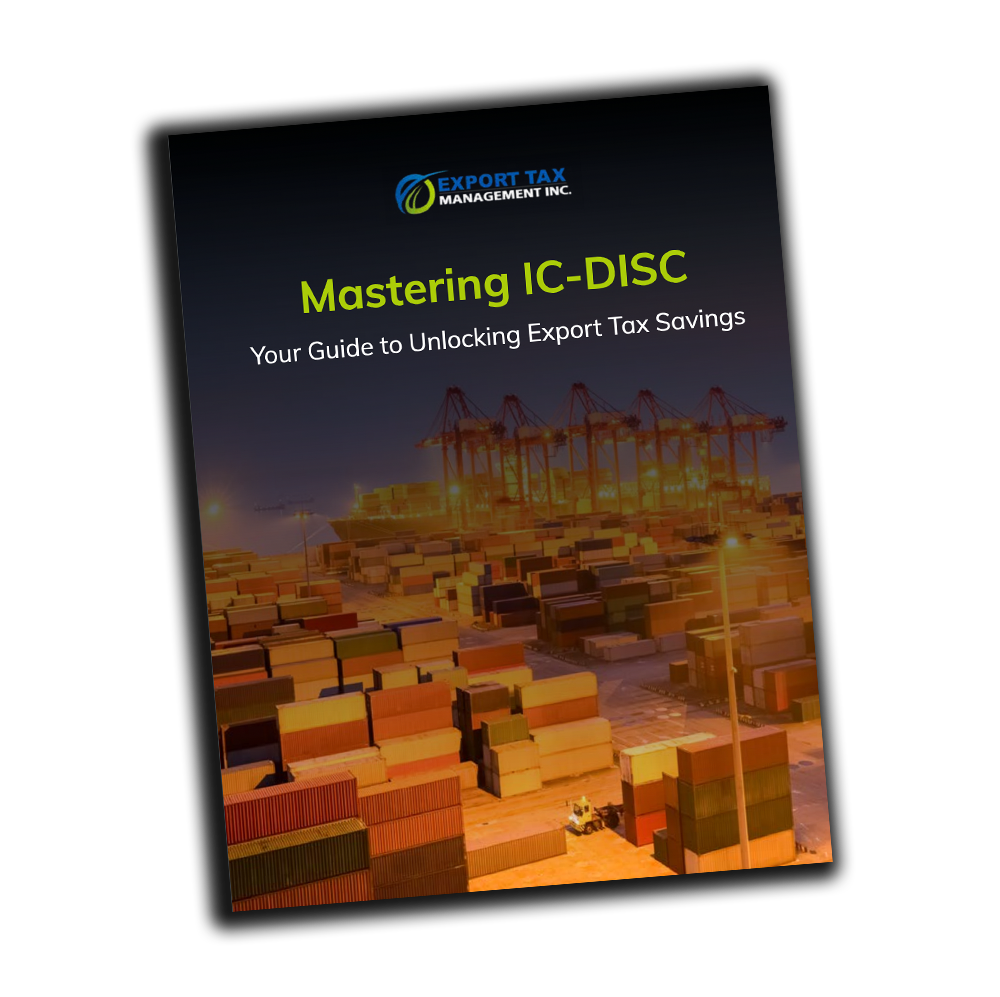IC-DISC Rules 2025 – Compliance, Formation, & Tax Savings
The Interest Charge Domestic International Sales Corporation (IC-DISC) is the last surviving federal tax incentive specifically designed to promote U.S. export sales. Established by Congress in 1971, the IC-DISC provides substantial federal income tax savings, but only when businesses strictly follow IC-DISC rules.
IC-DISC rules are the legal requirements companies must meet to form, operate, and maintain a qualified IC-DISC entity under the Internal Revenue Code. These standards cover eligibility, formation procedures, operational guidelines, documentation, and annual tax reporting.
Navigating IC-DISC compliance can seem complex, but understanding the process is critical to maximizing benefits and avoiding costly mistakes.
In this guide, we explain formation and operational requirements, common pitfalls, and why working with an expert matters. Whether setting up a new IC-DISC or managing an existing one, mastering the rules is essential for success.
To learn more about how an IC-DISC works, visit our complete guide on IC-DISC Explained. You can also explore real-world scenarios on our IC-DISC Example page.
Table of Contents
- Formation Rules and Requirements
- Operational and Compliance Rules
- Who Can Qualify for an IC-DISC?
- Common IC-DISC Mistakes to Avoid
- Why Work with an IC-DISC Specialist?
- FAQs About IC-DISC Rules
- Conclusion
Formation Rules and Requirements
Establishing a compliant IC-DISC entity requires careful attention to formation rules, as even small mistakes can disqualify a business from receiving valuable tax benefits. Exporters must follow a specific process to ensure the corporation meets all regulatory standards from the beginning.
- First, the IC-DISC must be created as a domestic C-Corporation under U.S. state law. It cannot be a partnership, sole proprietorship, or disregarded entity. The entity must maintain a separate legal existence distinct from its parent or operating company.
- A critical step is filing the Form 4876-A (Election to Be Treated as an IC-DISC) within 90 days of the corporation’s formation. Missing this filing deadline can delay eligibility for an entire tax year. You can find official instructions for Form 4876-A directly from the IRS website.
- In addition, an IC-DISC must maintain a minimum capitalization of $2,500 in authorized and issued shares. This requirement must be continuously met, as failure to maintain proper capitalization could jeopardize the corporation’s IC-DISC status.
- Shareholder considerations are also essential. Ownership and distribution planning should account for the tax treatment of dividends and the potential impact on individual or corporate tax returns. For further guidance on the setup and compliance process, visit our resource on IC-DISC Management.
Failure to adhere to IC-DISC formation regulations can result in significant penalties or a loss of the tax benefits altogether.
- Pro Tip: Missing the 90-day election window could cost a company an entire year’s worth of tax savings.
20+ Years IC-DISC Experience
Unlock Significant Tax Benefits with IC-DISC
Our objectives are simple: to provide you with maximum export tax savings, while delivering unmatched personal attention by our staff of CPAs. Schedule a free consultation today to discuss how Export Tax Management can help you.
Schedule Free ConsultationOperational and Compliance Rules
Once the IC-DISC entity is properly established, maintaining compliance with the applicable IC-DISC rules is essential. These regulations govern how the corporation must operate to retain its tax-advantaged status and avoid costly disqualification.
Below, we detail the primary operational standards that every IC-DISC must follow.
Qualified Export Receipts
An IC-DISC must derive at least 95% of its gross receipts from qualified export sales. “Qualified export receipts” include proceeds from the sale, lease, or rental of property manufactured, produced, grown, or extracted within the United States for direct use outside the country.
Examples of qualifying transactions include:
- Sale of U.S.-made machinery to foreign buyers.
- Engineering services for construction projects abroad.
Receipts that do not qualify include domestic sales and sales between related U.S. entities where no foreign use is involved. Businesses must carefully document each export transaction to verify compliance.
For more examples and detailed requirements, see our dedicated page on IC-DISC Commission Payment Rules.
External reference: The IRS IC-DISC Audit Techniques Guide offers insight into how auditors review qualified receipts.
Qualified Export Assets
An IC-DISC must also maintain at least 95% of its assets as qualified export assets. These typically include:
- Receivables from qualifying export transactions.
- Export property inventories.
- Temporary investments (if proceeds stem from export income).
If a corporation falls below the asset threshold, it risks disqualification under the strict IC-DISC compliance framework.
External support: For official asset qualification rules, review the U.S. Code § 992 outlining IC-DISC asset requirements.
Recordkeeping and Documentation
Strong internal documentation is crucial. Businesses must:
- Maintain separate books and records for the IC-DISC.
- Clearly document export transactions.
- Track commission payments and ensure they relate to qualifying sales.
Maintaining organized, complete records protects the company during an IRS examination. To better understand this process, explore our page on IC-DISC Tax Return.
Annual Tax Filings and Reporting
Every IC-DISC must file an annual Form 1120-IC-DISC with the IRS. The filing deadline matches the 15th day of the 9th month after the end of the corporation’s tax year.
Key points:
- Failure to file Form 1120-IC-DISC on time may result in penalties.
- Annual distribution of commission income to shareholders must also comply with timing requirements.
You can find in-depth filing guidance on our Form 1120-IC-DISC Resource Page.
Adhering to these core IC-DISC rules ensures your corporation remains in good standing and continues delivering significant federal tax benefits.

Who Can Qualify for an IC-DISC?
Qualifying for an Interest Charge Domestic International Sales Corporation (IC-DISC) requires meeting specific eligibility standards set by the IRS. According to IC-DISC rules, only certain types of businesses and products are eligible to take advantage of this powerful export tax incentive.
To form an IC-DISC, the entity must be a C-Corporation organized under U.S. law. This can include companies structured as Corporations, S-Corporations, LLCs (electing C-Corp tax treatment), Partnerships, or even individual-owned businesses willing to establish a new C-Corporation for the IC-DISC.
The business must sell products that are:
- Manufactured, produced, grown, or extracted in the United States; and
- Sold for direct use, consumption, or resale outside of the U.S.
Additionally, under the “50% U.S. content rule,” at least half of the product’s fair market value must come from U.S.-sourced materials, labor, or production costs. Export-related services like architectural, engineering, and construction services for foreign projects may also qualify under specific circumstances.
To explore more on this eligibility framework, visit our detailed breakdown on IC-DISC Benefits and read about how exporters can maximize their opportunities in our guide on Taxation of Foreign Income for Exporters.
Choosing the right structure at the start is critical to ensuring a compliant and effective IC-DISC setup.
20+ Years IC-DISC Experience
Unlock Significant Tax Benefits with IC-DISC
Our objectives are simple: to provide you with maximum export tax savings, while delivering unmatched personal attention by our staff of CPAs. Schedule a free consultation today to discuss how Export Tax Management can help you.
Schedule Free ConsultationCommon IC-DISC Mistakes to Avoid
While the Interest Charge Domestic International Sales Corporation (IC-DISC) structure offers outstanding tax benefits, failing to follow the proper IC-DISC rules can easily lead to disqualification, missed savings, or even IRS penalties. Many exporters unknowingly make mistakes that could be avoided with careful planning and ongoing compliance reviews.
Some of the most common IC-DISC mistakes include:
- Improper Entity Formation: Failing to establish the IC-DISC as a valid C-Corporation or missing the critical 90-day election deadline can render the entity invalid for the entire year. Learn more about how to set up correctly in our resource on IC-DISC Management.
- Inadequate Recordkeeping: Poor documentation of export sales, receipts, and commission payments is a major red flag during IRS audits.
- Misclassification of Qualified Receipts or Assets: Incorrectly including domestic sales or improperly categorizing assets can cause the IC-DISC to fail the 95% qualification tests.
- Neglecting Ongoing Compliance: Even after formation, regular maintenance is crucial. Many businesses make the mistake of assuming the IC-DISC is “set it and forget it.”
To avoid these pitfalls, the IRS provides guidance in its IC-DISC Audit Techniques Guide, which outlines key areas of risk.
- Quick Tip: Regular audits and working with an experienced IC-DISC specialist can prevent expensive mistakes and ensure your company remains compliant year after year.

Why Work with an IC-DISC Specialist?
Navigating the intricate world of IC-DISC rules is not something most companies can—or should—attempt alone. The process of forming, maintaining, and optimizing an IC-DISC requires deep technical expertise, attention to evolving IRS regulations, and careful strategic planning.
Working with a seasoned specialist, like Paul Ferreira at Export Tax Management, ensures that:
- Your IC-DISC is properly structured from the outset.
- Commission calculations are maximized within IRS guidelines.
- Annual filings, including Form 1120-IC-DISC, are completed accurately and on time.
- Ongoing compliance reviews catch small issues before they become costly mistakes.
An experienced IC-DISC advisor also helps you stay ahead of regulatory changes. The IRS occasionally updates procedures and audit priorities, and having a dedicated expert means you remain fully compliant.
Ultimately, the guidance of a specialist can mean the difference between maximizing your export tax benefits—or losing them altogether.
FAQs About IC-DISC Rules
If you fail to file Form 4876-A within 90 days of incorporating your IC-DISC, you will lose eligibility for that tax year. Under IC-DISC rules, no late elections are permitted. Missing the deadline could cost your company significant export tax savings. To avoid missing critical deadlines, it’s important to work with an experienced IC-DISC advisor. Learn more on our IC-DISC Management page.
Yes, in some cases. Although IC-DISC benefits primarily apply to the export of tangible goods, certain services—such as architectural and engineering services performed for projects outside the United States—can also qualify. Specific documentation is required to meet IC-DISC qualification standards. See how your business might benefit by reviewing IC-DISC Explained.
Annual reviews are essential. Even if your IC-DISC was properly formed, IRS guidelines and interpretation of IC-DISC rules can evolve. Regular internal audits, updated documentation, and careful preparation of your IC-DISC Tax Return help protect your benefits and avoid penalties.
Still have questions about setting up or maintaining an IC-DISC?
Contact Export Tax Management today for expert assistance tailored to your export operations!
20+ Years IC-DISC Experience
Unlock Significant Tax Benefits with IC-DISC
Our objectives are simple: to provide you with maximum export tax savings, while delivering unmatched personal attention by our staff of CPAs. Schedule a free consultation today to discuss how Export Tax Management can help you.
Schedule Free ConsultationConclusion
Understanding and adhering to IC-DISC rules is essential for any U.S. exporter seeking to unlock substantial federal tax savings. The Interest Charge Domestic International Sales Corporation remains a powerful but highly technical tool, requiring strict compliance across formation, operations, and annual reporting.
Even small mistakes can lead to disqualification or loss of significant tax benefits. That’s why partnering with an experienced IC-DISC specialist is crucial.
Ready to maximize your export tax savings with full IC-DISC compliance?
Contact Us today to schedule a consultation with one of the nation’s leading IC-DISC experts.
Take the first step toward protecting and enhancing your export tax incentives today.




